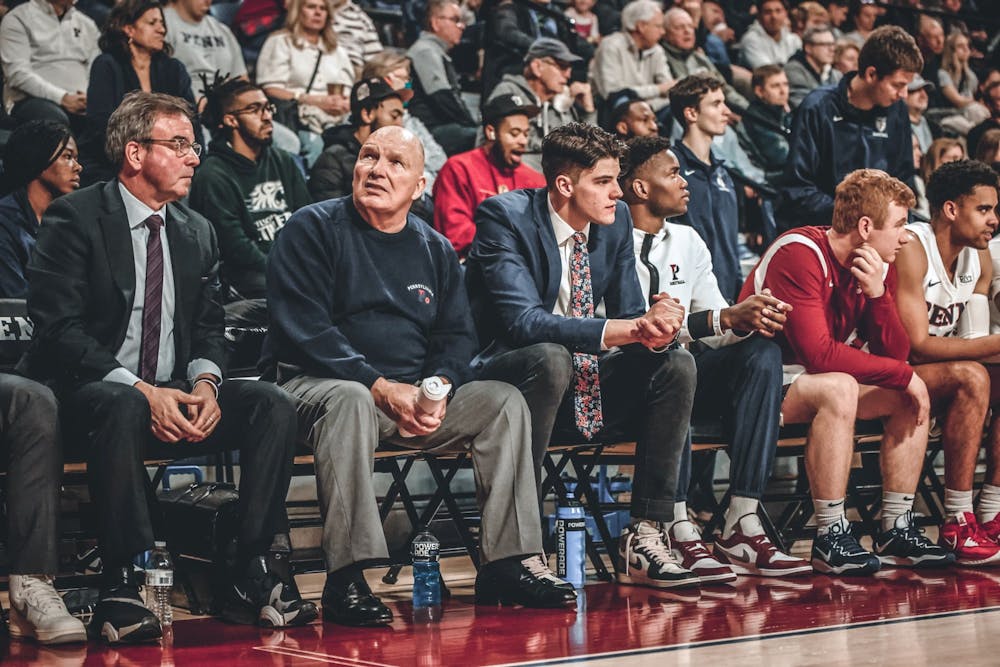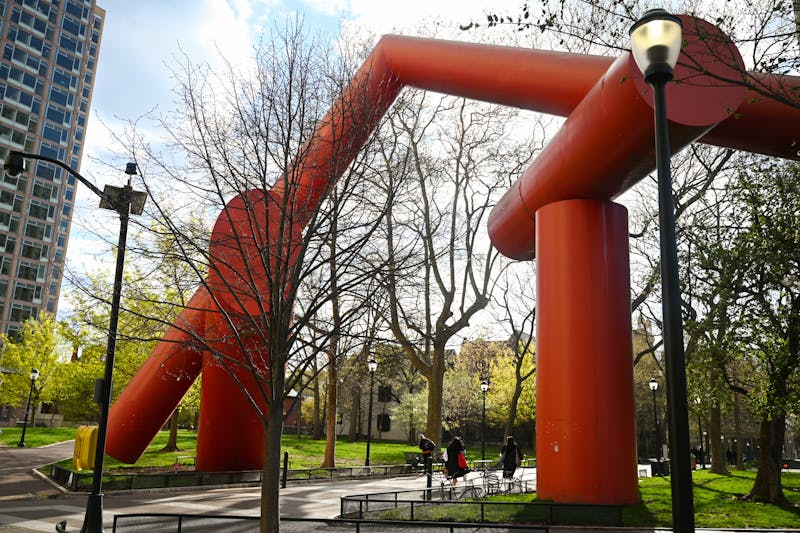
During a routine practice in December 2022, sophomore forward Gus Larson of Penn men’s basketball twisted his ankle, resulting in a season-ending injury and a formidable mental roadblock for the New Canaan, Conn. native.
Later on, during a scrimmage over winter break, Larson crashed into a teammate and landed in an unnerving position. After consulting with Penn Medicine, he was told he had a herniated disc in his L5 and S1 vertebrae — an injury that saddled him on the bench for the remainder of the new semester. For many of us, one semester isn’t a lot of time in the grand scheme of things. But for someone who’s lived and breathed basketball for the majority of their life, Larson’s physical injury also meant a profound injury to his mental health.
Going into a second season of basketball with no prospect of playing in the immediate future was a mental hurdle that Larson found himself at odds with. While his experience is not distinctive in that most athletes experience some form of injury over the course of their careers, his mindset in dealing with the psychological and physical repercussions of a season on the bench is unique.
Referencing his personal philosophy towards mental well-being, Larson said that he is "a big proponent of mental health over everything." However, Larson also noted that growing up playing basketball and leading into a collegiate basketball career, the sport became easily associated with his personal identity.
"One of the things that you grow up with is that your identity is a basketball player," Larson said regarding his injury, reflecting on the mindset of collegiate athletes that makes injuries all the more challenging to overcome.
Naturally, individuals who have dedicated much time and energy towards a sport find themselves tying their self-worth to their athletic abilities. However, that also makes it increasingly difficult to rebound from setbacks when that athletic ability is compromised.
Larson admitted that one of the most challenging aspects of having an injury as a athlete whose identity is intrinsically tied to a sport is "to have to sit there and be reminded every day that your missing out on something, the toll it takes on your mental health is quite severe." Injured athletes can experience a sense of isolation from their teammates, given that they can no longer participate in the same degree they once could.
Larson noted his frustrations with being unable to communicate with his teammates in the same manner because he felt his injury left him without the credibility to comment on what was happening on the court.
"It’s difficult to tell somebody to do something when you don’t do it yourself," he said.
Larson described having felt a fear of missing out while on the bench, both in terms of playing on the court and within his personal relationships with his teammates. For most athletes, self-confidence can be derived from their success within a sport. When their abilities are restricted, they must seek that confidence from external sources.
Athletes preparing to return encounter the added challenges of not only maintaining their physical health, but also regaining confidence in their abilities. More people must acknowledge that athletes’ unique talents don’t render them invincible to the mental pressures that any other person can encounter.
The invisible injuries associated with mental health when facing adversities as a student-athlete are perhaps even more pernicious in this sense: while broken bones can be fixed with a cast, it takes years of practice and dedication to develop the resilience-based mindset required to overcome mental roadblocks. Moreover, when the cast comes off, it’s a tangible sign that recovery has been achieved — but the road to recovery from mental setbacks is neither linear nor uniform.
Former UCLA basketball all-star and current Miami Heat forward Kevin Love made headlines in 2018 when he published his seminal essay on mental health in The Players Tribune, titled, “Everyone Is Going Through Something.” The essay detailed his decades-long battle with severe anxiety and depression, opening the door to conversations regarding the mental pressures that professional athletes battle — many of which arise early in their college careers. Regardless of the whether that conversation is prompted as the result of an injury or not, it needs to be held more often.
As Love wrote, "Mental health isn’t just an athlete thing. What you do for a living doesn’t have to define who you are. This is an everyone thing."
Love's mindset, in particular, was central to Larson’s recovery as he set out to redefine his sense of self. Larson noted that most practices turned into the constant reminder of the limitations of his abilities. As an athlete, it is an arduous battle to prioritize regaining physical strength when it feels like there's no concrete signs of improvement. This is why resilience is key.
While it can often be easy for athletes to become trapped in a negative mindset when faced with injury, Larson advocated for the value of exploring other interests. His time on the bench turned into a rediscovery for him: the rediscovery of how much basketball meant to him.
“That’s the biggest thing I’ve learned, to understand yourself, understand what you’re passionate about, and then go from there,” he said, explaining that regaining his confidence in other aspects of his life has allowed him to find self-worth outside of athletics.
Recently, Larson put up solid numbers on a fitness test, prompting an all-clear from his trainer to head back to the court. However, he remains optimistically cautious. He noted that a season on the bench has affected his physical fitness in various ways, and while he remains committed to regaining his full strength for the upcoming season, there’s still a long road ahead of him post-recovery.
Given his hindsight, Larson wants to encourage athletes to remember that injury is a temporary state of the body, whereas resilience is a continual state of mind.
“Mentally, I’m ready to go, but physically there’s work to be done," Larson said. "If you’re hurt right now, just know that you’ll heal one day, and you have to be ready for when that day comes.”
The Daily Pennsylvanian is an independent, student-run newspaper. Please consider making a donation to support the coverage that shapes the University. Your generosity ensures a future of strong journalism at Penn.
Donate







